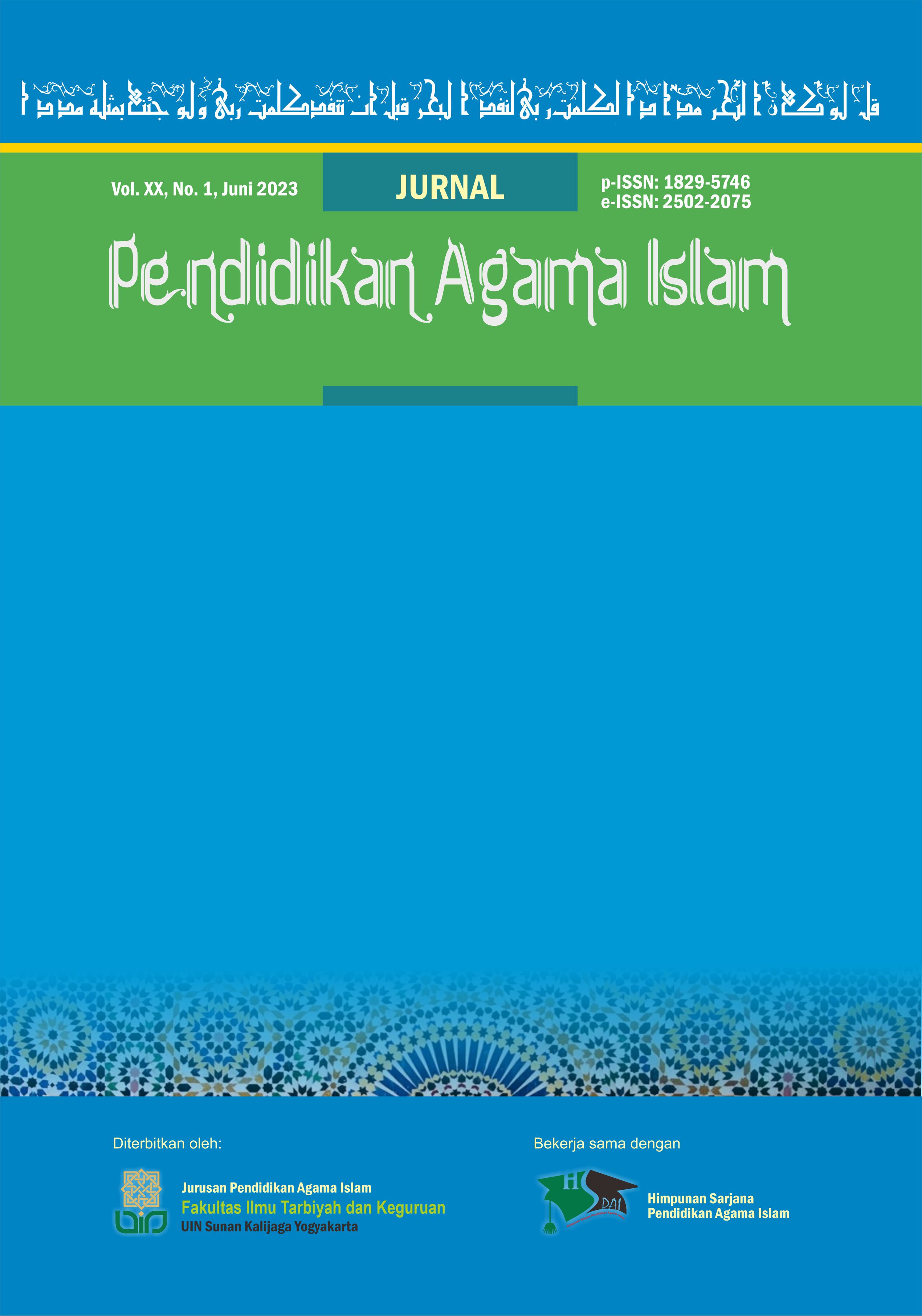Curriculum Reconstruction: Alignment of Profile, Body of Knowledge, and Learning Outcomes of the Indonesian Islamic Education Study Program
##plugins.themes.bootstrap3.article.main##
Abstract
Purpose – The misalignment between the profile with the body of knowledge (BoK) and the graduates’ learning outcomes (LO) of the PAI Study Program has caused the unclear educational objectives of the PAI study program, requiring the reconstruction of the PAI curriculum. This study aims to examine the reconstruction process of the PAI curriculum including the Profile, BoK, and LO of the PAI.
Design/methods/approach –The research was conducted qualitatively using survey, interview, and documentation methods packaged in seminars, guest lectures, workshops, and Focus Group Discussions. The subjects in this study were 83 PAI Study Program managers from Sumatra, Jakarta and Jabodetabek, DIY and Central Java, East Java, and the Eastern regions; the interviews were carried out with 15 study program managers. The obtained data was processed through the stages of reduction, display, and interpretation.
Findings – The results showed: 1) there are 6 profiles of Indonesian PAI after being reduced from 51 profiles, namely PAI teachers in schools/madrasahs, educational consultants, research assistants, administrators of educational institutions, Da’i/muballigh, and edupreneurs, 2) PAI’s Body of Knowledge consists of four scientific families: PAI science (what to teach), teaching science (how to teach), education and psychology (how to discipline), Research methodology, philosophy, language, technology, edupreneur (how to produce), 3) Graduate learning outcomes include in-depth mastery of PAI science, teaching, pedagogic, and PAI development, as well as how to teach PAI science effectively.
Research implications/limitations – This research has implications for the importance of preparing graduate profiles based on tracer studies, rather than based on ‘personal wishes’; and Learning outcomes must be adjusted to the standardized BoK of the Study Program.
Originality/value – the importance of profile mapping based on tracer studies, the significance of PAI’s body of knowledge in achieving PAI goals, and the importance of graduate learning outcomes for the expertise of PAI graduates.
Keywords:
Downloads
##plugins.themes.bootstrap3.article.details##
Copyright

This work is licensed under a Creative Commons Attribution-ShareAlike 4.0 International License.
Copyright Notice
Authors who publish with this journal agree to the following terms:
- Authors retain copyright and grant the journal right of first publication with the work simultaneously licensed under a Creative Commons Attribution License that allows others to share the work with an acknowledgement of the work's authorship and initial publication in this journal.
- Authors are able to enter into separate, additional contractual arrangements for the non-exclusive distribution of the journal's published version of the work (e.g., post it to an institutional repository or publish it in a book), with an acknowledgement of its initial publication in this journal.
- Authors are permitted and encouraged to post their work online (e.g., in institutional repositories or on their website) prior to and during the submission process, as it can lead to productive exchanges, as well as earlier and greater citation of published work.
References
Admisi UIN Sunan Kalijaga (2023). Data Mahasiswa Baru UIN Sunan Kalijaga Yogyakarta Tahun 2023. Laporan Penerimaan Mahasiswa Baru. Yogyakarta: UIN Sunan Kalijaga (tidak dipublikasikan).
Armstrong, M. (2005). A Handbook of Human Resource Management Practice (9th ed.). International Students Edition. London: Kogan Page.
Hasan, Noorhaidi (2022). Bangunan pengetahuan prodi Pendidikan Agama Islam. Dipresentasikan dalam Workshop Body of Knowledge PAI Indonesia, diselenggarakan oleh Perkumpulan Prodi PAI Indonesia, di Yogyakarta pada tanggal 26-28 September 2022.
Hasan, Noorhaidi (2023). Bangunan pengetahuan prodi Pendidikan Agama Islam. Dipresentasikan dalam Workshop toward Sustainable Future
for Indonesian Higher Education: Body of Knowledge & Learning Outcome of Islamic Religious Education. Diselenggarakan oleh Kementerian Agama Republik Indonesia bekerjasama dengan Perkumpulan Prodi PAI Indonesia, di Hotel Platinum Surabaya, 6-8 Pebruari 2023.
Jacobsen, David A., Paul Eggen, Donald Kauchak (2009). Methods for Teaching: Promoting Student Learning in K-12 Classrooms. University of Virginia: Pearson Merrill Prentice Hall.
Kemenristek Dikbud (2020). Panduan Penyusunan Kurikulum Pendidikan Tinggi. Jakarta: Kemenristekdikbud.
Keputusan Menteri Agama Nomor 394 Tahun 2003 tentang Pedoman Pendirian Pendidikan Tinggi Agama.
Kistoro, Hanif Cahyo Adi, Sutipyo, Difaul Husna, Norhafizah (2022). Dynamics of the Implementation of Experience-Based Religious Learning in Indonesian and Malaysian Senior High Schools. Jurnal Pendidikan Agama Islam, 19 (2), 283-296.
Latipah, Eva (2020). Identifikasi Kebutuhan Alumni, User, dan Stakeholders. Focus Group Discussion. Diselenggarakan oleh Prodi PAI UIN Sunan Kalijaga secara Hybrid pada tanggal 12 Desember 2020.
Latipah, Eva (2021). Effective teaching in psychological perspective: PAI teacher knowledge and skills. Jurnal Pendidikan Agama Islam. 18 (2), 215-226.
Latipah, Eva (2022). Pendataan penerimaan mahasiswa baru PAI pada tahun 2022 di berbagai Perguruan Tinggi di Indonesia. Hasil Survey. Yogyakarta (Tidak dipublikasikan).
Latipah, Eva (2023). Pendataan penerimaan mahasiswa baru PAI pada tahun 2023 di berbagai Perguruan Tinggi di Indonesia. Hasil Survey. Yogyakarta (Tidak dipublikasikan).
Murphy, Joseph., Stephen N.Elliot, Ellen Goldring, Andrew C. Porter (2007). Leadership for learning: a research-based model and taxonomy of behaviors. School Leadership Management. 27 (2), 179-201.
Oliver, G.R. (2012). Foundations of the Assumed Business Operations and Strategy Body of Knowledge (BOSBOK): An Outline of Shareable Knowledge).
Peraturan Menteri Pendidikan dan Kebudayaan Nomor 35, Tahun 2020 tentang Kerangka Kualifiikasi Nasional Indonesia.
Peraturan Menteri Ristek Dikti Nomor 44 Tahun 2015 tentang Standar Nasional Pendidikan Tinggi.
Peraturan Menteri Agama Nomor 16 tahun 2010 tentang Pengelolaan Pendidikan Agama di Sekolah.
Peraturan Pemerintah Nomor 55 Bab II Pasal 2, 2007 tentang Pendidikan Agama dan Pendidikan Keagamaan tentang Fungsi dan Tujuan Pendidikan Agama
Peraturan Pemerintah Nomor 55 Bab II Pasal 3, 2007 tentang Pendidikan Agama dan Pendidikan Keagamaan tentang kewajiban penyelenggaraan Pendidikan agama dan tentang Pengelolaan Pendidikan Agama.
Perkumpulan Prodi PAI Indonesia (2023). Naskah Akademik Body of Knowledge dan Capaian Pembelajaran Lulusan Prodi PAI Indonesia. Yogyakarta: PPPAII (Tidak dipublikasikan).
Ristekdikti, 2016. Peraturan Menteri Riset, Teknologi, dan Pendidikan Tinggi Republik Indonesia Nomor 126 Tahun 2016 tentang Penerimaan Mahasiswa Baru Program Sarjana Pada Perguruan Tinggi Negeri.
Undang-undang Guru dan Dosen Nomor 14 Tahun 2005.
Undang-undang Nomor 12 tahun 2012 tentang Pendidikan Tinggi Pasal 35 ayat 1
Undang-undang Republik Indonesia Nomor 20 pasal 37 tentang Sistem Pendidikan Nasional tahun 2003.
https://www.banpt.or.id/direktori/prodi/pencarian_prodi.php
1030
Views
1280
Downloads





